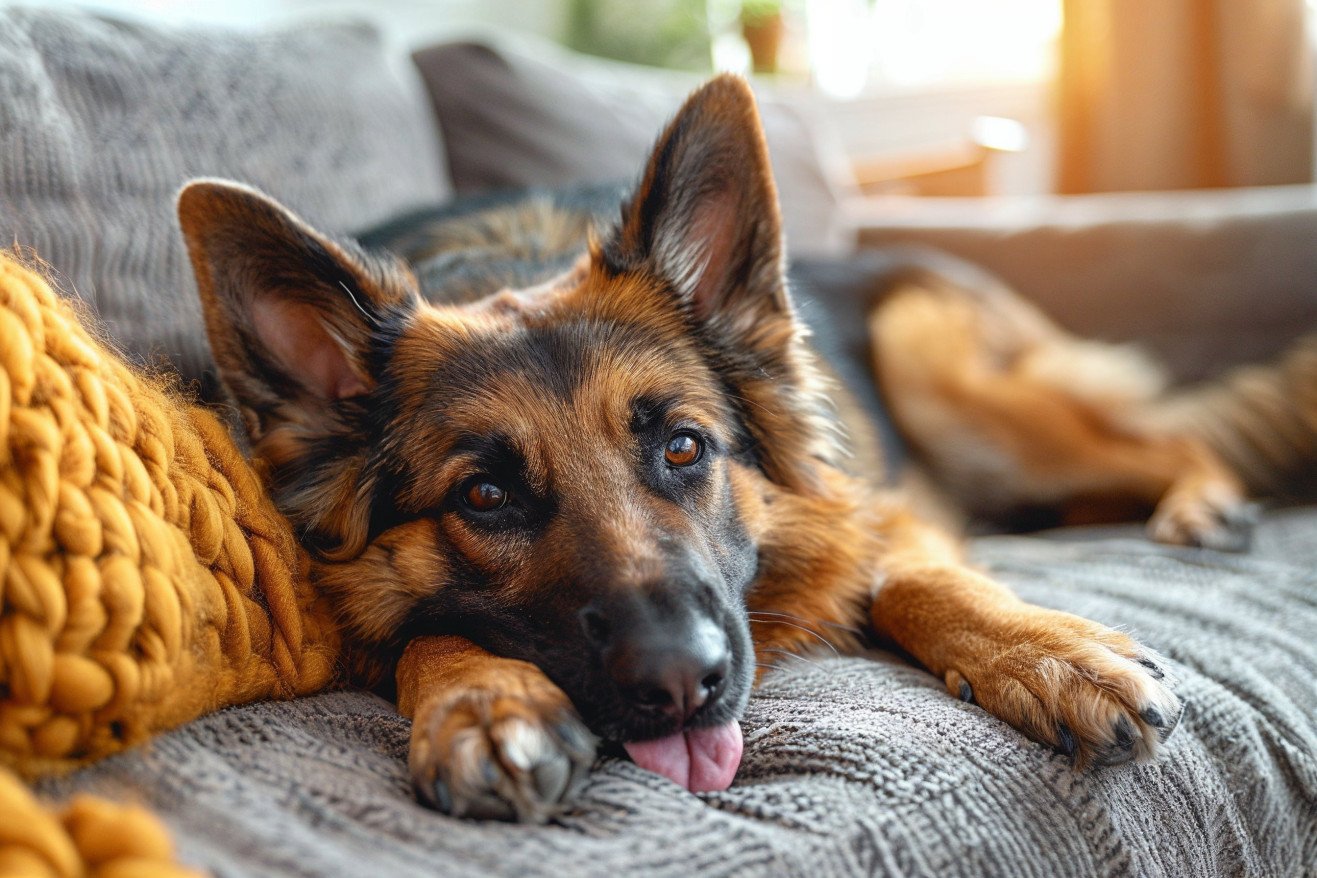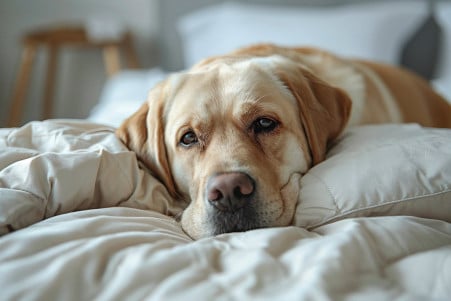Why Does My Dog Lick the Couch? Uncovering the Canine Behavior
28 February 2024 • Updated 27 February 2024

You may be wondering if your dog’s habit of licking the couch is adorable, strange, or something to worry about. While boredom, anxiety, the taste of food residue, or even medical issues like allergies or gastrointestinal problems could be to blame, there are many reasons why your dog may be licking the couch.
However, if your dog is licking the couch excessively, it’s always a good idea to check in with a vet to make sure there aren’t any underlying health issues.
We will be covering a variety of expert perspectives from veterinary science, animal behavior research, and nutritional studies to help you better understand why your dog may be licking the couch. Our goal is to give dog owners a more holistic view of the physiological and psychological reasons behind this behavior and offer some tips to make sure your dog is as healthy and happy as possible.
Why does my dog lick the couch?
Behavioral and Psychological Factors
Behavioral issues, such as boredom or anxiety, can cause dogs to lick the couch. A study published in PMC found that dogs with separation anxiety often showed signs of physical activity and vocalization when left alone, which are signs of distress that can lead to licking.
In addition, PetMD notes that dogs’ natural inclination to self-soothe can cause them to engage in repetitive behaviors, like licking. Dogs often lick in response to psychological factors, including the need for stress relief or the desire to create a soothing routine.
The dog’s environment also matters. Changes in a dog’s schedule or household can disrupt their sense of security, leading to stress-related behaviors like licking. In addition, dogs can lick more if they are rewarded for the behavior, even if the reward is unintentional. For example, a dog that gets attention for licking the couch may continue to do so in the future in the hopes of receiving social reinforcement.
By recognizing these psychological factors, dog owners can work to create a more soothing environment that reduces stress-related licking. This can involve maintaining a consistent schedule, ensuring dogs get enough mental and physical exercise, and creating a safe, soothing environment for their pets. By addressing the root causes of the behavior, dog owners can help their pets develop healthier coping strategies and improve their overall quality of life.
Medical Issues That Cause Licking
If your dog is licking the couch constantly, it could be a sign of an underlying medical issue. The Animal Medical Center lists gastrointestinal disorders as the most common medical causes, which include nausea, acid reflux, and inflammatory bowel disease.
A study in the Journal of Veterinary Behavior: Clinical Applications and Research also found that eosinophilic or lymphoplasmacytic infiltration and delayed gastric emptying were gastrointestinal abnormalities that were associated with excessive licking. Allergies can also cause licking, especially if they lead to itchy skin.
It is important that dog owners don’t write off excessive licking as a behavioral quirk. Instead, they should make sure to take their dog to the vet to rule out these medical issues.
Depending on the diagnosis, treatments can include anything from medication to dietary changes. It’s important that dog owners stay on top of their dog’s health and make sure to get them help if they notice any strange behaviors that won’t go away, as this could be a sign of an underlying medical issue that needs to be addressed.
By doing this, you will not only make sure that your dog is healthy, but you will also make sure that your home is a happy and comfortable place.
The Role of Diet in Your Dog’s Licking Behavior
Just as diet can impact human behavior, it can also impact the behavior of our furry friends. When trying to understand why dogs lick the couch, one of the first things to consider is diet. According to Faunalytics, the nutrients in a dog’s diet can impact the parts of the brain that control behavior. Poorer diets can lead to a condition called pica, where dogs forage and eat non-food items, which could include licking.
Nutrient deficiencies and food allergies can show up in a number of ways, including oral behaviors like licking. According to Big Dog Pet Foods, the essential nutrient cofactors that are required for hormone and neurotransmitter synthesis are derived from the diet, and lower levels of these cofactors can lead to an increase in behavioral issues.
In addition, if a dog’s diet is not palatable, which is determined by the food’s quality and nutrient content according to the Association of American Feed Control Officials, the dog may look for satisfaction in other ways, including licking your furniture. As a result, many experts recommend a balanced diet that’s customized to your dog’s individual needs, which can help reduce the desire to lick inappropriately.
It’s important to talk to your vet before you make any changes to your dog’s diet. They can offer personalized recommendations, taking into account any allergies or sensitivities, that will help support your dog’s health and reduce unwanted licking behaviors.
Olfaction and the Smell of the Couch
Dogs’ sense of smell, which is much more specialized and sensitive than humans’, is one of the main reasons they may be drawn to lick the couch. According to a paper in PMC, dogs’ olfactory systems allow them to detect both current and past smells, including the potentially enticing or interesting smells that can be found in the fibers of a couch.
This ability to smell is how dogs learn about their environment, and it may be why they are drawn to licking a couch that has absorbed so many scents.
But it’s not just the smell that’s drawing them in; it’s also the taste. A study in PLoS ONE shows that dogs have a different sensitivity to bitter tastes than humans, which can affect their interactions with objects based on the objects’ residual flavors. This difference in taste sensitivity may be why dogs are drawn to lick certain objects, like couches, that have absorbed food smells or human scents.
Different breeds have different olfactory abilities, and genetics can play a role in a dog’s likelihood of scent-driven behavior, so it’s possible that a dog’s breed-specific sensory abilities may make them more likely to lick the couch.
Dog owners can help manage their dogs’ sensory exploration and discourage excessive licking by keeping their homes clean, using deterrents to keep dogs away from objects they’re not supposed to lick, and providing dogs with alternative toys that stimulate their senses. This will help dogs explore their world in a healthy way and keep the couch from becoming too much of a sensory wonderland.
Avoiding the Pitfalls: Limiting Your Dog’s Exposure to Toxic Chemicals
Your dog’s licking habits are influenced by the home environment, and this is especially true when it comes to the presence of cleaning products. A study by PetMD found that household items account for 8.3% of pet poisonings, and this is because pets can be poisoned by inhaling, ingesting, or coming into contact with them.
This includes common toxic chemicals like ammonia, bleach, and phenol, which can cause everything from drooling and vomiting to seizures. Tru Earth also notes that chemical cleaners, including floor and counter cleaners, are a major concern and can be especially dangerous.
Pet parents can limit exposure and reduce the likelihood of their dogs licking by using pet-safe cleaning products, avoiding harsh smells, and keeping toxic chemicals in a place that’s inaccessible to their pets. It’s also important for pet parents to make sure that any surfaces that have been cleaned are completely dry before they let their dogs back into the area.
Your dog’s environment can be manipulated in a number of ways, from using products that are less likely to be licked due to residue to those that are less likely to be licked due to their scent.
By paying attention to the products you use and their potential effects, you can make sure that your home is a safe place for your dog. In doing so, you’ll also protect your pet’s well-being and ensure that your home remains a lick-free zone.
The Science of the Lick: Why Dogs Lick the Couch
In the fascinating world of dog behavior, a number of different things can lead to a dog licking the couch. Behavioral causes like boredom and anxiety, medical issues such as gastrointestinal problems, dietary reasons like nutritional deficiencies, sensory factors like the presence of scents, and even environmental factors like household toxins—all can contribute to this behavior.
For dog parents, the important thing is to pay attention. You can learn to tell the difference between harmless idiosyncrasies and signs of a more serious problem by keeping an eye on your dog’s licking habits. And make sure to get professional help if the behavior gets out of control, as it could be a sign of an underlying medical issue.
Recognizing that there are many things that can lead to a dog licking the couch also emphasizes the importance of being a good pet parent. Not only will you build a better relationship with your dog by constantly observing and interacting with them, but you’ll also be better able to address their needs.
In closing, it’s important to note that determining why your dog is licking the couch is a process that may require a mix of empathy, science, and sometimes, professional help. But every lick is a sign, and as their human, it’s our responsibility to pay attention and respond accordingly.


